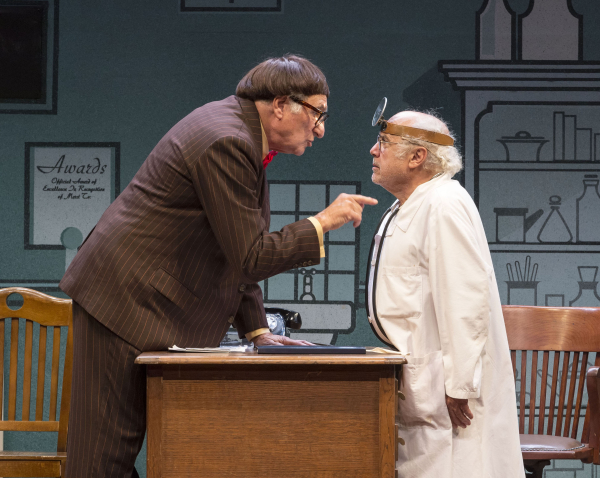Neil Simon’s The Sunshine Boys
The hit play has lost its luster but any opportunity to see Judd Hirsch live should be taken.

(© Craig Schwartz)
This revival of The Sunshine Boys is a triple dose of nostalgia. The play’s subject matter celebrates the early-20th-century art of vaudeville. The play itself, which originally opened on Broadway in 1972, represents signature Neil Simon from his heyday. Lastly, costars of the ’70s classic sitcom Taxi, Judd Hirsch and Danny DeVito, embody the dueling former comedy partners Lewis And Clark, respectively. Hirsch is exquisite, bringing fragility yet dignity in the face of senility, but DeVito seems miscast, playing the same irascible character he had on Taxi sans nuances.
Once leaders at sketch humor, Al Lewis and Willie Clark have split apart, professionally and personally. They have not spoken in over a decade. A CBS variety show brings the two together, but their old habits continue to infuriate each other. They may have been called “The Sunshine Boys” in the past, but the futility and inevitability of old age follows them wherever they go these days.
The Sunshine Boys has many hilarious and insightful lines, but it is not one of Simon’s funniest plays. Several scenes drag, and though the theme of aging is timeless, the script itself meanders. When the two characters perform their famous doctor sketch on CBS, it lacks punch. Simon does capture the frustration, alienation, and cruelty of aging. Lewis and Clark were so respected once that they still get telegrams from Lucille Ball and Bob Hope, yet their accommodations are decrepit hotel rooms or back rooms in children’s homes, jobs no longer come, and if they do come, they are for products to which neither Lewis nor Clark can recall the names. Simon has always been adept at finding the humor in pain, and here is no exception.
Director Thea Sharrock has been given several pantomime scenes, one that works and one that seems to go on forever. In a scene worthy of Laurel and Hardy, Hirsch and DeVito rearrange the furniture to set up their skit. Due to memory loss and stubbornness, both have different visions of what the set should look like and continuously redo the other person’s actions. Another scene, with the estranged partners drinking tea, the tension should be deafening with humorous results, but the timing instead feels drawn out.
DeVito is a savvy comedian. Though he specializes in growling bears, there are distinct differences from insecure, snappish Louie De Palma from Taxi, slovenly Frank from It’s Always Sunny in Philadelphia, and self-important Martin Weir in Get Shorty. However, here DeVito turns Clark into a collection of tics and outbursts. The jokes are more like shtick than something rooted in the character. DeVito is also distinctly Italian, and his mannerisms and voice do not suspend disbelief for the audience that he is a Jewish character.
Hirsch, on the other hand, is magical as the more introspective of the two. With a distinct yet subtle Eastern-European accent, he gives the impression that Lewis is at peace. While DeVito’s Clark explodes like a petulant child, Hirsch’s Lewis goes gracefully toward old age. He is resolved but still strong with a load of spit and a dangerous finger to prove his potency.
As Clark’s put-upon nephew, Ben, Justin Bartha is endearing as the target of his uncle’s frustration. As someone who gives more than he takes, he comes off as a charitable and loving relative, not as a doormat.
With the producers’ need to replace the late Richard Griffiths (who starred alongside DeVito in the London premiere of this production), the casting of two television legends must have looked good on paper. Hirsch and DeVito had such chemistry for years on Taxi. Their banter brought both of them Emmy awards. In a different vehicle, that dynamic would be as bright as sunshine. But because DeVito seems incorrect as the former clown star, Neil Simon’s play does not fit the bill.








